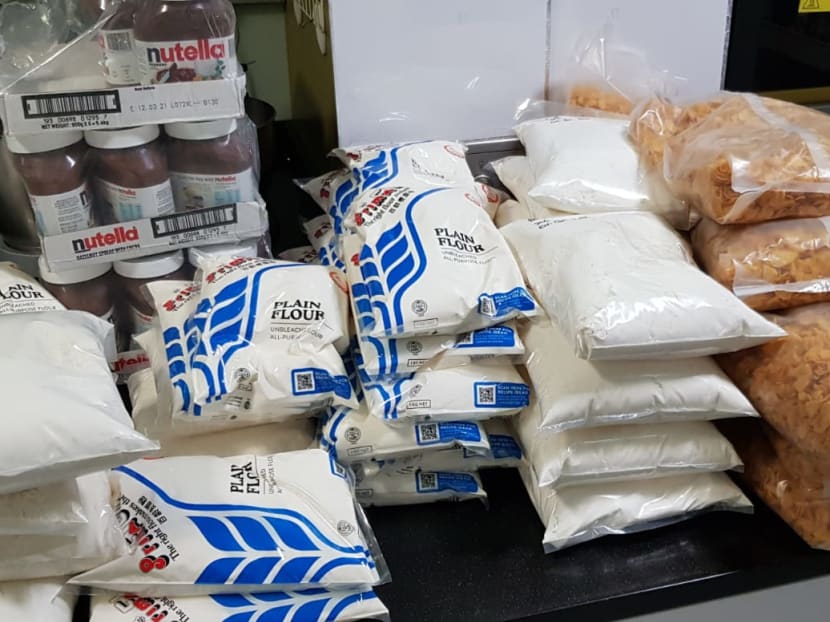Some shuttered home-based F&B businesses lament lost Ramadan, Hari Raya bumper sales
SINGAPORE — After giving birth to her second child on March 29, when the Covid-19 outbreak in Singapore appeared to be fairly well under control, Ms Siti Raudha, 33, decided to take a two-week break from her home-based food business to rest.

Ms Juliana Ramli’s ingredients that she bought to fulfil orders during Ramadan and Hari Raya Puasa will go unused for her home-based F&B business, at least for now.
SINGAPORE — After giving birth to her second child on March 29, when the Covid-19 outbreak in Singapore appeared to be fairly well under control, Ms Siti Raudha, 33, decided to take a two-week break from her home-based food business to rest.
She had started Gourmet by CT, which operates via Instagram, in 2014 after leaving her full-time job as a traffic controller. Her husband, too, left his job as an auxiliary police officer in 2016 to help her when her business started to pick up.
The pair cook and sell savoury Malay-Western fusion meals such as lemak chilli padi pasta and rendang pies as well as sweet treats such as the traditional Malay horseshoe-shaped cake, tapak kuda. Buyers were able to pick up these food items at the couple’s place or have them delivered by couriers.
Just as she was getting back into the swing of things after the birth, confirming orders for the holy month of Ramadan and Hari Raya Puasa, a major religious festival for Muslims, news emerged on Sunday (April 26) that home-based businesses, including those dealing in food and beverage (F&B), must meet certain criteria to keep operating or face a S$1,000 fine.
The Government said that these businesses can remain open if they only operate online without requiring business owners or workers to leave their homes, and do not require customers or third-party delivery services to collect or deliver goods at the residences.
“We were speechless when we heard the news. We have no idea how things are going to pan out. I had postnatal depression after giving birth to my first child so I’m really trying to stay calm but with everything that’s going on, I’m not sure how to handle it,” Ms Siti said. Her first child is two years old.
“We will have zero income. I had already taken pre-orders for Hari Raya dishes and I already bought ingredients which are obviously not cheap. I was ready to just go all out with my orders because I need to cover the two weeks when I was on a break and had no income coming in,” she added.
Regulations to further limit business activities and restrict movement of people were announced last week and they are meant to last until at least May 4 during the circuit breaker period that has been extended to June 1.
Mr Farid Khan, president of the Singapore Malay Chamber of Commerce & Industry (SMCCI), said in a Facebook post on Saturday that the organisation will “work closely with all relevant authorities to look into matters urgenty”.
Thankfully, all of Ms Siti’s customers were understanding and did not request immediate refunds. They will allow her to fulfil their orders when the containment measures are lifted.
Ms Juliana Ramli, who runs Crumbs N Batter on Instagram, is also grateful to her customers who told her that they do not mind receiving their Hari Raya goodies after June 1, over a week after the festive day.
Ms Juliana, 44, a home baker who has been selling cookies, tarts, cakes and other desserts from her kitchen since 2014, told TODAY that she will lose 80 per cent of her income due to the temporary closure of her business — when orders are usually at an all-time high.
“The increase in Hari Raya sales has always helped me pay for my sons' tuition fees and childcare fees during lull periods. Outside of that, sales are at a minimum so Hari Raya is when I earn to save for later months,” the mother of three said. Her husband works as an assistant engineer.
Ms Juliana, who used to work as an allied educator, now conducts tuition classes online once a week apart from her baking business and uses the income from her bakes to care for her nine-year-old son.
“My son was diagnosed with kidney cancer (in 2018). Even though he has been in remission for a year, I try to give him better quality food. My baking business has allowed me to spend more on him. With the loss of income, it will be tough for me to give him the kind of care I have been giving him since he was diagnosed. We are trying to take as much care as we can of that one kidney he has left,” she said.
For Ms Syakilah Khamaruddin, 26, whose husband works as a delivery driver, the closure of her home business where she reaches out to customers on Instagram to sell beignets, or deep-fried choux pastries originating from France, will result in a “big hit” to their income, she said.
“It’s upsetting because this has been a significant source of income. Even if it's just a small business, it still helps us. Now we have to depend on my husband’s salary. We can't spend much.”
Ms Syakilah, who has three children aged five to seven, wishes that the authorities would give home operators like her some leniency because “we also take extra precautions”. “How are we different from other restaurants who have delivery riders go and pick up food?” she asked.
Home-based business owners, however, are not the only ones affected by the tightened measures. Mr Mohamad Noor Hadi, director of Avana Singapore, a company that started eBazaar, a virtual Hari Raya bazaar where shoppers can find a variety of items from crafts to food to festive outfits and accessories, said that 50 per cent of his vendors had been forced to pull out.
“Half of the vendors who signed up are e-commerce businesses while the other half are home-based. Right now, we’re unsure of how things will pan out with eBazaar as it is still unclear what can and cannot be done during the circuit breaker,” he said. “But we remain positive things will work out.”
Mr Mohamad Noor added that he has had no income since February due to other events that his company organises being cancelled.
One other home-based business operator is Ms Adeline Tan, whose dessert business might not necessarily be affected by Ramadan and the festivities of Hari Raya Puasa. She was excited to get back to selling her baked goods after eye surgery in March.
The 23-year-old home baker, whose vision is partially impaired since the surgery, has been selling customised cakes, brownies and cookies full time since she graduated from university last July. She lives with her parents and sister who are all working.
“I know I’m in a much better position than many out there who are the sole providers of their families," Ms Tan said.
A petition on Change.org titled "Allow Small Home-Based F&B Businesses to Operate with Compliance to Circuit Breaker Rules", directed to the Housing and Development Board and the Ministry of Trade and Industry, was started on Saturday by two friends who have chosen to be known only as Nad, 23, and Fae, 30. Their genders are not known.
As of 9pm on Monday, the petition has secured 65,000 signatures, well on the way to its goal of 75,000.
The duo, who do not run a home-based business themselves, told TODAY that they started the petition knowing what it feels like to “be struggling in the midst of an unexpected crisis”.
“We know that the circuit breaker measures are important. We, too, are adhering to the regulations. This petition was made in support of home-based businesses that were not prepared for the prohibition and we hope that the relevant authorities can take action to either ease the prohibition or support them,” Fae said.
While they are aware that their petition might not overturn any rules, Nad and Fae are glad that like-minded organisations have started fundraisers for affected home-based businesses.
“The majority of these business owners depend heavily on their sales as a source of income, especially those coming from low-income families. Hopefully, they will be supported through this difficult time,” said Fae.
Mr Masagos Zulkifli, Minister of the Environment and Water Resources, said in a Facebook post on Monday that he was “alarmed" that there are some people trying to incite home-based food business operators to pressure the Government to make exceptions for them.
“This is irresponsible. They are purportedly fighting for the rights of the entrepreneurs but they're only rubbing more salt into their wounds — because they know the Government cannot make exceptions to any sector affected in the tightened circuit breaker period,” he said.








